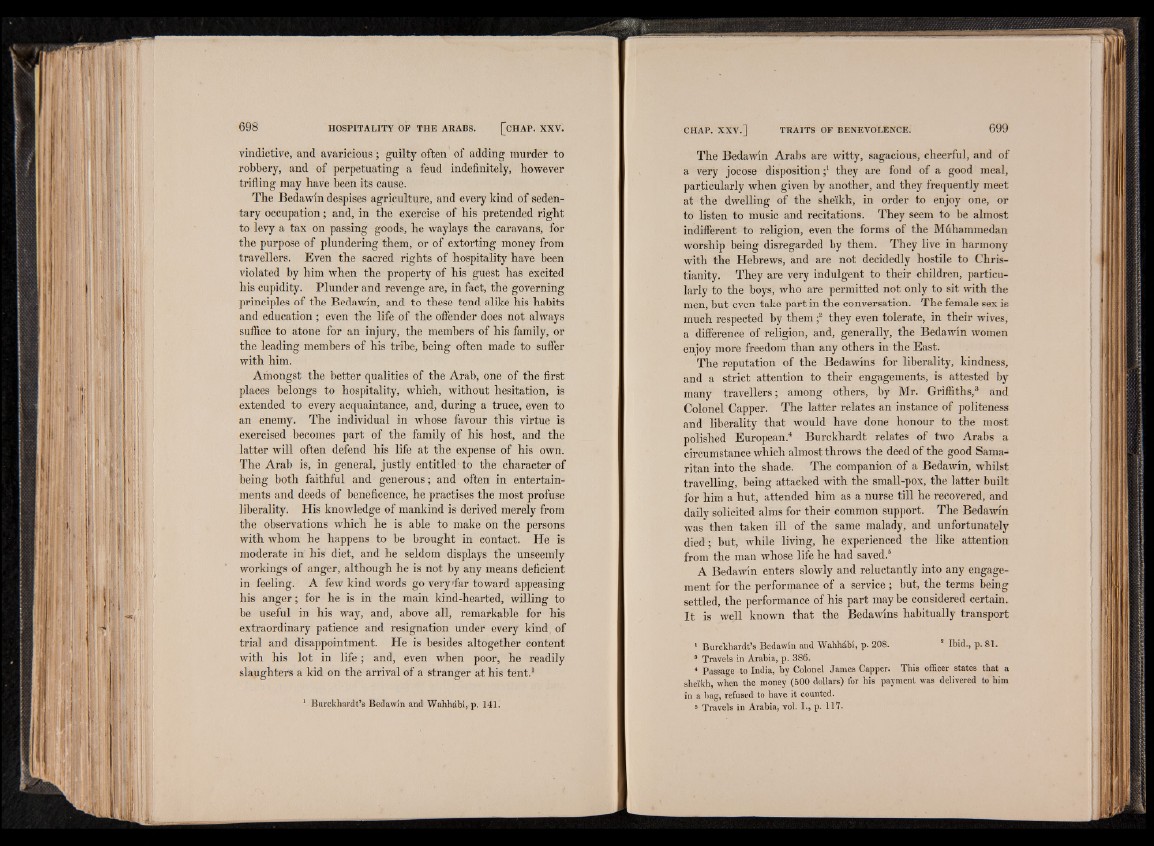
vindictive, and avaricious ; guilty often of adding murder to
robbery, and of perpetuating a feud indefinitely, however
trifling may have been its cause.
The Bedawin despises agriculture, and every kind of sedentary
occupation; and, in the exercise of his pretended right
to levy a tax on passing goods, he waylays the caravans, for
the purpose of plundering them, or of extorting money from
travellers. Even the sacred rights of hospitality have been
violated by him when the property of his guest has excited
his cupidity. Plunder and revenge are, in fact, the governing
principles of the Bedawin, and to these tend alike his habits
and education ; even the life of the offender does not always
suffice to atone for an injury, the members of his family, or
the leading members of his tribe, being often made to suffer
with him.
Amongst the better qualities of the Arab, one of the first
places belongs to hospitality, which, without hesitation, is
extended to every acquaintance, and, during a truce, even to
an enemy. The individual in whose favour this virtue is
exercised becomes part of the family of his host, and the
latter will often defend his life at the expense of his own.
The Arab is, in general, justly entitled to the character of
being both faithful and generous; and often in entertainments
and deeds of beneficence, he practises the most profuse
liberality. His knowledge of mankind is derived merely from
the observations which he is able to make on the persons
with whom he happens to be brought in contact. He is
moderate in his diet, and he seldom displays the unseemly
workings of anger, although he is not by any means deficient
in feeling. A few kind words go very'far toward appeasing
his anger; for he is in the main kind-hearted, willing to
be useful in his way, and, ahove all, remarkable for his
extraordinary patience and resignation under every kind of
trial and disappointment. He is besides altogether content
with his lot in life ; and, even when poor, he readily
slaughters a kid on the arrival of a stranger at his tent.1
The Bedawin Arabs are witty, sagacious, cheerful, and of
a very jocose dispositionthey are fond of a good meal,
particularly when given by another, and they frequently meet
at the dwelling of the sheikh, in order to enjoy one, or
to listen to music and recitations. They seem to be almost
indifferent to religion, even the forms of the Muhammedan
worship being disregarded by them. They live in harmony
with the Hebrews, and are not decidedly hostile to Christianity.
They are very indulgent to their children, particularly
to the boys, who are permitted not only to sit with the
men, but even take part in the conversation. The female sex is
much respected by them f they even tolerate, in their wives,
a difference of religion, and, generally, the Beda win women
enjoy more freedom than any others in the East.
The reputation of the Bedawins for liberality, kindness,
and a strict attention to their engagements, is attested by
many travellers; among others, by Mr. Griffiths,3 and
Colonel Capper. The latter relates an instance of politeness
and liberality that would have done honour to the most
polished European.4 Burckhardt relates of two Arabs a
circumstance which almost throws the deed of the good Samaritan
into the shade. The companion of a Bedawin, whilst
travelling, being attacked with the small-pox, the latter built
for him a hut, attended him as a nurse till he recovered, and
daily solicited alms for their common support. The Bedawin
was then taken ill of the same malady, and unfortunately
died; but, while living, he experienced the like attention
from the man whose life he had saved.6
A Bedawin enters slowly and reluctantly into any engagement
for the performance of a service ; but, the terms being
settled, the performance of his part may be considered certain.
It is well known that the Bedawins habitually transport
1 Burckhardt’s Bedawin and WahMbi, p. 208. ! Ibid., p. 81.
8 Travels in Arabia, p. 386.
8 Passage to India, by Colonel James Capper. This officer states that a
sheikh, when the money (500 dollars) for his payment was delivered to him
in a hag, refused to have it counted.
8 Travels in Arabia, vol. I., p. 117-